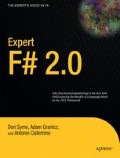Abstract
F# is effective and productive primarily because it’s built on the tried and tested constructs of functional programming. This chapter covers the core building blocks of functional programming with F#, including simple types and function values, pattern matching, lists, options, and sequences; as well as how to declare some of your own simple types. Chapters 4 through 6 cover imperative programming, generics, and object-oriented programming.
Access this chapter
Tax calculation will be finalised at checkout
Purchases are for personal use only
Preview
Unable to display preview. Download preview PDF.
Editor information
Rights and permissions
Copyright information
© 2010 Don Syme, Adam Granicz, and Antonio Cisternino
About this chapter
Cite this chapter
Syme, D., Granicz, A., Cisternino, A. (2010). Creating Your First F# Program— Introducing Functional Programming. In: Andres, C., et al. Expert F# 2.0. Apress. https://doi.org/10.1007/978-1-4302-2432-7_3
Download citation
DOI: https://doi.org/10.1007/978-1-4302-2432-7_3
Publisher Name: Apress
Print ISBN: 978-1-4302-2431-0
Online ISBN: 978-1-4302-2432-7
eBook Packages: Professional and Applied ComputingApress Access BooksProfessional and Applied Computing (R0)

